#some of these are sillier parallels i left out of part 1 and some i connected the dots for after posting part 1
Explore tagged Tumblr posts
Text
















[ID: a compilation of panels from “yona of the dawn”, focused on parallels between hak and yona (left column), and gija and jaeha (right column). descriptions of each panel are included in alt text. end ID.]
ch. 75 & 204; 63; 108 & 107; 134 & 105.1; 107 & 95; 137 & 130; 226 & vol 19 title page; 254 & 133
-> part 1
#some of these are sillier parallels i left out of part 1 and some i connected the dots for after posting part 1#so it’s kinda all over the place tonally. but who cares. i’m having fun <3#love how many of these occur within at most a few pages of each other btw#akayona#gijaeha
64 notes
·
View notes
Text
spike, angel, buffy & romanticism: part 2
part 1: “When you kiss me I want to die”: Angel and the high school seasons
*
“Love isn’t brains, children”: Enter Spike as the id
For all that I’ve just discussed all of the ways that the first three seasons subvert the romance of Angel, it’s also true that the writing still fundamentally takes him—and Buffy’s relationship with him—seriously. To some degree it has to. Because Buffy is the show’s emotional anchor, if the writing didn’t take her emotions seriously, the audience wouldn’t either. It needs to be sympathetic to her (regardless of whether it endorses her, per se), or else it would run the risk of losing all pathos. Making fun of Buffy and Angel makes for a great gag in “The Zeppo”, and fits with the general way that season three undermines the romanticism of them, but if that was the show’s attitude the whole way through, it would come off as simply meanspirited. It would seem like it was making fun of Buffy for being a stupid teenage girl in love, instead of sympathetically depicting the human experience of being caught up in big, tempestuous emotions.
But at the same time, if the writing were to only take romance seriously, that wouldn’t feel very true either. Or fit with the general Buffy ethos, which loves to flip between serious and silly moods in order to capture all sides of whatever it’s exploring. And therein is the magic of Spike’s addition to the chemistry of the show. Practically from his introduction, Spike parallels Buffy’s romantic storylines, except unlike Buffy, Spike is allowed to do the comic or morally incorrect thing. His status as a soulless vampire means that the show is free to use him to point out both the sillier and darker sides of romance, without tainting Buffy’s heroism or the seriousness of her emotions.
In “Becoming, Part 2” for example, Spike is free to explicitly say that he’s saving the world because he wants Dru back, and leaves Buffy to die once he’s gotten her. Whereas Buffy, despite also wanting the person she loves back, ultimately chooses to save the world rather than keep him. Spike allows the episode to show what Buffy’s, or anyone’s, romantic id might want, without Buffy herself going through with it. He also allows the episode to show the ridiculousness of the romantic id, by giving him comic moments like “Didn’t say I wouldn’t”, or “God, he’s going to kill her”, or beating Angel with a tire iron, or any of the times that Buffy makes fun of him (“The whole earth may be sucked into hell and you want my help ‘cause your girlfriend’s a big ho?”). All of which is in contrast to the tragic seriousness of Buffy’s heartbreak. Spike in season two is not a character without pathos; in fact, he has quite a lot of pathos that parallels Buffy’s--think of the tortured close-up on his face as Angel and Drusilla taunt him in “I Only Have Eyes For You.” But neither is he limited or defined by that pathos.
He plays a similar role in both “Lovers Walk” and “The Harsh Light of Day”. In “Lovers Walk” he’s devastated by the loss of Drusilla, as Buffy was devastated over Angel in “Anne”, yet the way they get out of their respective depressions is very different. Tonally, “Anne” plays Buffy’s misery extremely straight, and when Buffy decides to stop moping and become an agent in her own life again, her version of “agency” means getting in touch with her leadership and heroism. Whereas for Spike, agency means a love spell, or torturing Drusilla into liking him again. The romantic id tries to re-possess the object of its desire, whereas the ego or superego is able to set that desire aside, whether or not it wants to. More obviously, Spike in “Lovers Walk” parallels all of the other characters and their romantic situations. All of them are behaving somewhat selfishly or self-destructively in their love lives (Xander and Willow cheating, Buffy and Angel torturing themselves with friendship) but are in denial about the fact that they’re doing so. And then Spike blazes in with his version of love that is selfish, scary, grandiose, charming, pathetic, genuine, and absurd by turns—and suddenly, everyone’s romantic weaknesses are out in the open. It makes perfect sense that Spike finishes the episode gleeful and optimistic, because “Lovers Walk” as a whole represents a triumph of the romantic id over the romantic ego, if only temporarily. And it’s all handled with a brilliantly whiplash-y mix of comedy and tragedy because at the end of the day, the power of the romantic id really is ridiculous. The way that Spike turns on a dime between being scary and pathetic parallels the way it’s at once absurd, and kind of frightening, that your id would make you, say: cheat on your wonderful high school boyfriend, just to have a chance with your childhood crush.
Because Spike is often treated as the show’s romantic id, the writing’s relationship to his romanticism gets complicated. Like Angel, there is something romantic in his aesthetic and behavior, even if he doesn’t look like Angel’s conventional Byronic hero. He wears a long, dramatic coat, poses rebelliously with his cigarettes, and dotes on his paramour with the elaborate attentiveness of Gomez Addams. But unlike Angel, he is not just a romantic symbol or object, he is also a romantic subject. That is to say, Spike’s romantic storylines tend to emphasize his romantic desires, and use those desires as motivation. By contrast, Angel’s storylines don’t really have much to do with whether he’s “gotten” Buffy or not—instead they have to do with whether Buffy has gotten him. The fact that Buffy and Spike are both treated as romantic agents in this way is a key indication that the two characters are meant to parallel each other. Angel’s side of the Buffy/Angel romantic storyline has to do with whether he can control himself around Buffy, whereas Buffy’s has to do with whether he likes her or wants to be with her. Similarly, Spike’s romantic storylines hinge on the status of whether Drusilla or Buffy want him.
Not only is Spike a subject when it comes to romantic relationships, he’s also a subject when it comes to Romantic thinking. He is a character practically defined by his romanticism. He aspires to romantic things, and therefore can be used to poke at romantic outlooks. Despite his grand love for Drusilla for instance, she still cheats on him, and he still has to knock her out, do a love spell, or torture her to get her back. Or he’ll make grand pronouncements that are immediately followed by things like getting tasered by the Initiative or falling into an open grave. Because of this, Spike is able to parallel Buffy’s Romantic thinking as well, not just her romantic desires. Notice how in “The Freshman”, when Buffy is feeling out of touch with her Romantic Slayer self, that she has a scene where she’s treated like Spike--she delivers a dramatic threat and then falls through a ceiling. Or in “Some Assembly Required” when she obeys her id and hotly demands that Angel listen to her, she falls into an open grave. This kind of comedy has a lot in common with the deadpan Angel humor discussed in the last section, but notice that the target of that humor is Angel’s romantic objecthood rather than an outlook Angel has. Angel’s role, when it comes to romanticism, has to do with how Buffy and the audience sees him, whereas Spike’s role (at least in the early seasons) has to do with how Spike sees, period.
The show doesn’t just poke at Spike’s outlook though, it also uses him to poke at other people’s romanticism. In season two, for example, Spike is the one who gets impatient with Angel’s grandstanding, sarcastically explaining that “we do still kill people, you know” and “it’s a big rock.” In “Lovers Walk” he’s the one who cuts through Buffy and Angel’s drama, reducing it to “googly eyes” with a dismissive handwave (while also building it up in his projection-y “you’ll never be friends” speech). In “Something Blue” he points out that Willow is barely holding it together. In “Pangs” he’s the one who brings the debate over the Chumash nihilistically back down to earth, and in “The Yoko Factor” he schools Adam on Yoko not really splitting the Beatles apart. In other words, Spike attempts to see both the romance and the reality of things. He is the avatar of both, which I would argue makes complete sense, because in many ways romance and reality are really two sides of the same coin. Poetry and stories are fake and bigger than life, but you use them to tell truths. But being the id, his point of view can be hypocritical and biased as much as insightful, just like anyone’s gut reactions and poetic notions can be. After all, you can use poetry to tell lies, too.
Lastly, on a meta level, there is a tackiness to Spike that undermines his romantic qualities better than making him dangerous ever could. Spike likes Passions and Dawson’s Creek (in contrast to Angel reading La Nausée by firelight). He lives in a crypt, but the vibe is more “homeless” than “Dracula” (in contrast to Angel’s tastefully decorated apartment). Spike may act like a romantic, but what does it say about how romantic romanticism really is, that the romantic things he likes can be so unrefined? And with the chip, he’s rendered impotent and pathetic. To me, there’s no more perfect image of how the writing uses Spike than the image of him in his black coat, red shirt, and big, leather boots, blasted under the fluorescent light of his Initiative cell. Light that makes his aesthetic seem suddenly fake and silly and surreal. For all that the writing subverts Angel, he is still the kind of character who gets to disappear mysteriously into the shadows, because he is the romance that Buffy has been forced to abandon. Whereas Spike is left with no place to hide.
If Angel represented the idea of binaries, then Spike represents the lack of them. There is a reason that Spike invites so many queer readings. He is a vampire, but he loves. He is an object, but he’s a subject. He tells the truth, but he lies. He is a villain, but he is a hero. He is masculine, but he is feminine. He is insightful, but he’s a fool. He is pathetic, but he is sympathetic. He is on the outside of the Scoobies, but he is on the inside. These aspects of him are not split between different personas, but exist within him simultaneously. It is telling that the show introduces human, mythos-bending vampires like Spike and Dru in a season about disillusionment, and it is telling that Spike’s role in the show becomes ascendant in the seasons after Buffy leaves Angel and his split personality behind. As Buffy begins to reckon more deeply with her id, and her dualities, she will begin to reckon with Spike.
part 3: “Something effulgent”: Season five and the construction of Spike the romantic
148 notes
·
View notes
Text
Fairytale Complex - [Undertale | Sans x Reader]
[Gender Neutral, Frisk's Parent Reader | Slow Burn]
Chapter Three | sans. (Part 1 of 3)
[First] | [Previous] | [Next]
meet me by the train station.
the place's bustlin' and tori's here with me, just in case you're worried 'bout meeting a stranger all alone.
That's surprisingly thoughtful.
And I'm guessing Tori means Toriel?
The goat lady who looked after Frisk?
yup.
she's gotta go deal with some legal stuff 'bout us living on the surface, so she can't stay for long.
but she'll still be here by the time you get there.
Hmm…
Now that just makes me more suspicious of you.
Tell me why it's important that only you specifically want to talk to me about this?
Doesn't Toriel know about what happened down there, too?
yeah, but…
i need to talk to you about somethin' else.
stuff that'll probably be a lil' difficult for me to explain, but that you should still know, being frisk's parent and all.
Now I'm curious.
I'm stuck in some traffic, but I should be there soon.
Would it still be okay with Toriel if I get there in the next ten to fifteen minutes?
textin' while drivin'?
My aunt chose to drive me here.
'Cuz she also said she doesn't trust the whole situation much.
heh.
alright.
tori says it's fine. she doesn't need to leave in the next hour so…
see ya soon, (l/n).
See you soon, mister Serif.
"How's he gonna know who you are if only you have a picture of him?" you aunt asks, eyes locked on the road. Her bright red nails, just as flashy as the rest of her outfit, glisten under the sun, fantasy jewellery and wrist watch doing the same. Her tanned skin almost glows with health in comparison to yours, yet to be healed from the past two months of tension and wait. There's also her signature and almost hair salon professional level of cleanliness when it came to grooming her hair, making her overall, outer appearance far more different and striking when compared to you.
"(Mom/Dad)'s all over the news now!" Frisk says, answering her question before you can even word your thoughts out in mind, too busy noticing how much you've let yourself go in so short of a time.
You plug your phone to the car charger and meet with the side view of your aunt's face. "Like Frisk said. The guy I'm meeting says my face's been thrown out on the news a lot lately, so he already knows what I look like." You pull down the mirror and take a quick look at yourself, eye bags and stress acne now partially covered with a cheap, (s/t) foundation and expression made to look less tired thanks to a full eight hours of sleep. Still, you're far from looking anywhere near to the days before Frisk's disappearance or all the pictures displayed on the news, these from a similar time. All the stress and constant sorrow was still present on most of your features, from something as subtle as the loss of brightness in your eyes to something as noticeable as the drag in your walk and the small slump in your posture.
"Do I look okay, auntie?" you ask, taking advantage of a stop sign.
Brenda spares a quick but meaningful glance at you and a small smile manages to show on her face. She stays quiet even as her eyes go back to facing the road. At a second stop, this one caused by a red light, she looks at you again, saying, "Why are you so concerned about that, dear? I get wanting to look well and dignified for meeting new people, but this is the third time you've asked me today." She giggles when Frisk does, both apparently sharing the same thought. "You look fine, by the way. Though a bit of rest could do you good." The light changes and she carries on driving, slowing down and turning on the signal when she sees the train station to her left. "How many hours do you work, by the way? If you're still working overtime, you should stop that now. Not only for my dear grandchild's sake, but for you to get your long overdue beauty sleep."
"...Sixty hours a week?" you mutter, already anticipating a dramatic reaction from her. Even Frisk seems to notice your answer's not favourable enough to her, so they brace themselves by grabbing on to their seatbelt and pretending they're not paying attention to the conversation anymore.
Staying true to herself, Brenda almost slams the brakes just as she's halfway into parallel parking and snaps her gaze over to you, eyes wide and mouth agape. "What?!"
"Sixty a week," you repeat, louder now. "I had to get my mind off Frisk going missing somehow, so I... took that chance to save up some more by working overtime."
"That's fifteen hours too much, dear." She frowns. "That's either twelve hours a day for five days a week, or working non-stop every day for at least eight to nine hours! No wonder you look so stressed. What about your friends? Your family? Your coworkers?" She seems to notice why you've lowered your voice and does that herself, reminded over Frisk's presence at the back seats. "Oh, honey…" She sighs. "Did you really just work, eat, and sleep those two months they were gone?"
"...Maybe," you reply, looking away from her. "I just didn't know what else to do, and having free time for myself made me feel more guilty about it. The only time I sat down was to watch some TV for when I couldn't sleep at night."
Your aunt finishes parking and lets out another sigh. A gentler look crosses her eyes and she gives in, letting her body relax. "Do you have enough to get by? Please, be honest with me so I can help you out. Alright?"
You smile back at her and nod. "I have enough now. I'm pretty sure I can get by with a regular schedule again."
"With weekends off?"
"With weekends off."
Her smile grows and she unlocks the car, allowing you to step out. "Be careful out there, alright? Just make sure to call me and I'll head back here straight away if anything strange comes up."
"Thank you, auntie. So I'll pick up Frisk at five?"
"Oh, there's no rush. You can always stay the night, anyway!"
After a nod, you get down from the car, open the back door, and climb onto the empty seat left next to Frisk.
"See you later, dear."
You kiss their cheek and look at the phone resting in their hands. There were plenty of questions you wanted to ask them, such as who was Alphys and how she'd gained enough knowledge to develop something with that level of technology, and why it still worked up here despite being programmed to function at the Underground. You remind yourself of the people waiting for you at the train station and wrestle those curiosities down, setting all questions aside for later. "Be good, okay?"
They nod, sign a "Love you!" with their hand, and hold you back to give you a yellow sticky note, folded in two. "Give this to him. And don't forget he can be unexpected sometimes!"
You sign an "I love you, too" back to them, take the note, and step out of the car, waving at them and your aunt before closing the door and pocketing the note away. It stays unread, and while you'd like to know what's written on it as well as the reasons for Frisk warning you about meeting with that monster in particular, they'd specified it was for more sillier reasons, like that of meeting up with a stand up comedian, or more frankly put: a clown or a court jester.
Now alone, you take out your phone and check the messages, a new one from 'Mister Serif' showing up.
hey, uh…
tori hadda go.
an emergency happened, so now she's gotta rush off to the department to see what's up with some documents she turned in.
i know this seems sus as hell, so just wait for me at a more open area, alright?
stick to anybody you're comfortable with and we'll meet there.
I'm honestly touched at how much you're worried about this.
Though all that just makes me think I'm being catfished even more now.
Are you for real, mister Serif?
Can someone be as observant and thoughtful as you appear to be?
see for yourself.
>> Attachment - 1 image
You can't avoid being taken aback when the monster sends you a picture of himself. It's a definite recent one, given he's sitting by a bench close to the train tracks. He holds up a shaka sign with one hand and a coffee cup on the other. A grin decorates his face and the bright lighting shows the picture was taken just now, sun rays piercing through the windows.
I'm somewhat convinced.
need more proof?
Who are you, my Cinder match?
if u wanna.
Oh God.
You're killing me.
inna good way?
Perhaps.
You stop yourself when you realize you're on the verge of flirting with someone you haven't even met in person yet, let alone introduce yourself properly to. The picture he'd sent doesn't help either, as you can only begin to question yourself and your morals over having found him attractive for a split second. While it could have just as easily been the surprise of him sending a picture out of nowhere, it could've also been how laid-back he seemed in that picture, striking a shaka sign that made him look just like a surfer dude and a coffee cup to contrast with that vibe, adding a spark of the typical college student you saw at campus, his hoodie and sneakers only adding to that feeling.
It's then that you realize something's off.
If he was holding a cup with one hand and a sign in the other…
Then who took the picture?
Though you're pretty sure you're overthinking the situation now, you're still better safe than sorry and take advantage of your recent fooling around with him to pass that worry off as a joke.
Wait a minute, mister Serif.
yeah?
If you're holding a cup with one hand and striking a pose with the other, then who took the picture?
Or did you use your magic for that?
a random dude who looked trustworthy enough took it for me.
he's one of those guys who're totally ok with us living here at the surface, so he just snapped the picture for me and even asked if it was for a date i was gonna meet and all.
no magic needed.
And I'm the President of the United States.
But, seriously now…
Are you for real?
yeah.
>> Attachment - 1 image
The picture displays him with a bearded, brown skinned man clad in a suit and holding a suitcase, looking ready for work. Still, his smile shows little to no seriousness and instead displays youth and content over having his picture taken with a potential friend. His height surpasses the monster's by half a foot, though when you compare it to the rest of the people in the background, it's clear Serif is simply shorter compared to the average human. You try not to let your eyes linger too much on the monster when you're done looking at the man, not wanting to fall into the trap of your mind having found him attractive earlier ago. Still, you can't help yourself and take a more thorough look at him again, seeing him now with his eye sockets closed, almost mimicking a pair of eyelids squinting in joy. His arm's hung over the man's shoulders, and vice-versa.
i made a new pal.
"meet up already!" - his words, not mine.
Trying to be smooth, huh?
maybe.
is it working?
Somewhat.
But...
Strange Cinder date vibes aside,
I'm almost there.
aight.
can't wait to meet ya, bud.
You slip the phone back in your pocket and go up the stairs of the train station, stopping when you make it to the line of benches close to the tracks. True to his word, the skeleton sits on one of them and the man who'd taken a picture with him is now waving at him, seemingly saying his goodbyes and headed off to work. You approach the station one careful step after the other, pace slowing down more and more as you feel a sudden awkwardness slip on your shoulders.
Your texts sent off vibes you didn't want present now that you were about to meet him in person. You were still worried about what happened with Frisk a few days ago, and how their happiness pretty much froze when being asked if the monsters had treated them well during their time at the Underground. The one you were about to meet could very well be one of those who'd hurt them, so you brace yourself and try not to be swayed by the softer atmosphere present during your texting with him. You acknowledge the man who'd taken his picture with a wave and a smile back at him. Then, you continue walking and finally approach the bench.
"It's nice to meet you, mister Serif." You acknowledge him with a wave, unsure of how friendly you can be with him.
"Likewise, pal." He holds a hand out to you, bringing forth the warning Frisk had given to you about him.
Out of all the things Frisk had warned you about, it was to be careful around the skeleton, but primarily due to how he seemed to be the type to joke around and prank people often. One thing in particular you were warned about was in shaking hands with him, so right as he offers his hand out to you and just as you're about to reach out, you miss his hand, take a step closer, and pull him along for a hug instead. You then unfold the sticky note and press it against his back with enough pressure for him to feel it and let go when you're done.
"Frisk warned me about you, and even though they haven't told me anything I should be worrying about yet, I do know I should be careful for other reasons. And they told me to give that note to you, by the way."
You sit down and watch as the monster attempts to get the sticky note unstuck, his short height proving to be a disadvantage, as it also comes with shorter arms. He goes as far as to use his magic to get it out, leaving you to bite back a smile and wonder if you've been too rude with him just now. Still, you wait and keep your eyes on the train tracks while he reads the note you've left for him.
"Not gonna say anything about it?" you ask, surprised to hear nothing from him even as he slips the note in his pocket.
"Patience, pal," he replies, words followed with a chuckle and continued with a wink. "Just take it as some friendly payback on my part -- Now we're even." He sits back down and meets with your eyes, his expression changing from humoured to stern at the drop of a hat. "So, what you're sayin' here is the kid hasn't said much about me yet?"
"No," you reply, hesitating. You fight between keeping a smile and a frown. "They've been awfully quiet after I asked them if there were any people down there who treated them badly." You catch yourself becoming emotional, so you breathe and blink a few times to fight that back. "It... It feels like they shut themselves away from me, and now I'm not too sure about how to approach the situation anymore." You stop to catch your breath again, feeling yourself grow anxious already. "They can talk non-stop when it's about all the good things Toriel, Alphys, Papyrus, and… And even what you did for them, but whenever I ask if there was anything that made them feel unsafe, they… They bottle up and run off to do whatever chore there's left to do around the house."
A gust of wind helps freshen up your burning face, product of a train stopping nearby. You wait for him to speak up, body tensed all the while.
"Y'know, I…" The monster sighs, faces down, and rubs the back of his neck, looking lost in thought. "I think I can answer that for ya, but it's gonna be a bit of a long story." He glances at his phone for a moment, seemingly to check the time, and later adds, "Wanna head out somewhere to eat? We can talk about it there over food and drinks. Better than talkin' on an empty stomach, don't you think?"
Despite how somber the mood's become, that trademark grin of his you've already grown used to seems to stand out a lot more now, bringing forth a genuine, welcoming expression in addition to the offer he'd made to you. "Sure," you reply, smile returning. "And... Sorry for dumping all that on you all of a sudden."
You both stand up and make your way out of the station, walking side by side as you continue with the conversation.
"It's cool, pal," he says. "I'd be a lot more worried if you didn't worry about it."
[First] | [Previous] | [Next]
-------------------------
This turned out to be a whopping 7k+ word long chapter, so it's been divide into 3 parts (between 2k to 3k words each, which is the usual length of each update).
So... Long story short: there'll be a double update next week in order to post Parts 2 and 3!
Expect the same thing for whenever a chapter exceeds that limit. :-)
#sans x reader#undertale x reader#lgbt#lgbt themes#gender neutral reader#male reader#female reader#mother reader#father reader#parent reader#chubby reader#long fic#romcom#adventure#mystery#platonic relationships#slow burn
103 notes
·
View notes
Note
CHjakldfjskANA I am lowkey embarrassed to say that I am confused by pt 2 of Ignis Fatuus ;-; I get what happens literally, but I'm pretty sure I'm missing out on all of the more underlying messages and what the ending is supposed to represent and what you were intending to convey ;-; I guess I'll just talk about parts that I thiNk I understood and hopefully won't make me sound like an idiot :D I really liked how the endings to both the dream and reality were paralleled,
but houf I was kind of exasperated in the beginning when everyone was dying on the hypothetical trip to the hospital. I always kind of felt like they would just let Y/N die, because logically speaking, even if they ended up at the hospital, none of them are really qualified to treat TSS so they would just be going on a suicide mission because as shown, zombies are e v e r y wh e r e :D So when it was revealed that was only a dream, I was like yAY thank goodness :,,) The part at the end before
Y/N dies when Jungkook corrects her saying “it’s did well and not did good” was a reaLLY nice way to end things though :,) jklsfjkls I don’t know, Chana pls send help+explanations because I’m definitely only understanding the very surface level ideas of Ignis Fatuus D: I think the very vEry ending though is a big part of the whole Ignis Fatuus thing though because back in pt 1 in Target Jungkook was like omg yes don’t worry Y/N things will be over and we’ll definitely be able to play baseball
again without any zombies around, but aaa Chana why are there thRee “endings”,, that’s making me think there’s something very elaborate about how all of the endings could be tied together/are related :,D 🌻 anyways I think? the first part to my ask might've not gone through because it didn't have the "thank you, your ask has been received" message when I clicked ask but o well :,) it was just me lowkey embarrassing myself because I am confused on the ending of Ignis Fatuus :,)

[SPOILER WARNING!]
GOOD NEWS! the first part of your ask WAS received!! and omg yes i totally understand ignis fatuus pt 2 was kinda hectic so lemme just clear up the confusion ✨
i think the whole ignis fatuus stORY is a bit hard to digest. the only ‘realistic’ element in the story is really that the members self-quarantined LOL. other than that, i really took inspiration from the office (though it may not seem like that). jungkook and yn are the only “normal” ones in the group of eight just like jim and pam were the only normal ones in an office full of crackheads LMAO. i just thought it would be cool to tell the story of two normal pple stuck with six other crazies (all equally obsessed with something different. i mean namjoon studying DURING the apocalypse?? seokjin obsessed with the kitchen? hoseok obsessed with his secretary??) and i chose to go for a very subtle romance so it wouldn’t overshadow the other dynamic characters
to elaborate on the endings!
the first one (the one that yn dreams): only in her wildest dreams would the seven men yn’s learned to love and live with DIE to save her. i mean, in a sick, twisted way, isn’t that what so many romance movies depict? the knight sacrifices his life to save his princess. it’s shit that only happens in your head. it’s tragic and stupid, yes, but also honorable in it’s own way. maybe yn subconsciously wanted all seven men to help save her life (even though it wouldn’t logically make sense). but maybe she wanted a knight in shining armor. i mean, isn’t that what media brainwashes women to think? yn’s dream is her subconscious acting up. she’s a helpless woman (sick from a mf bacterial infection that women mostly get) and she must depend on men to save her. but the end of her dream concludes that it’s not a matter of who saves who. some people just can’t be saved. yn doesn’t have a knight in shining armor. even before she got sick, she is a strong, independent woman. jungkook offers her emotional support, but he never outwardly saves her from any disasters. in fact, in part 1, yn is the on who saves jk. maybe, in yn’s subconscious, she wants to be saved. who doesn’t? it’s not a female v. male thing. being saved just means doing less work (and who doesn’t want that?). the savior, on the other hand, must go through the trauma and carry the responsibility of another’s life. maybe that’s why yn had her dream! another, more obvious reason yn’s dream turned out that way may be because that’s her worst fear—watching everyone she cared about die in front of her eyes (but also being too helpless to be able to stop it). she’s also afraid of dying alone, which she did in her dream. you’re absolutely right though! the second part of ignis fatuus is supposed to make you feel exasperated—frustrated and pissed, even. it’s just supposed to be nonsense, honestly. just stupid shit happening in rapid succession. it’s literally a fever dream. and also a dream carefully crafted by yn’s subconscious
a lot of the ‘deeper’ meaning is very subjective, though! and even as the writer, my analysis is still subjective. you can honestly analyze ignis fatuus in so many other ways. no analysis is wrong. and it’s also perfectly fine to have no analysis at all!
the second ending (with yn actually dying) is easier to explain. it’s a direct contrast from yn’s dream where everyone was trying to be the hero. reality is different. even at the end of part 1, joon and jk knew that they wouldn’t be able to take yn to the hospital. yoongi even knew yn would die. they wouldn’t even think of such an outrageous idea to go to the hospital at all. they may have hinted taking yn to the hospital only to make her feel better, to make her feel safe. but they would’ve never actually done it. the plan was always to let her die in the house (as sad as it sounds). but there was really nothing left to do! as you said, none of them (even joon and tae) is qualified to treat tss (nor do they have the medical equipment to do so). the second ending is more of the closure that the first ending didn’t provide. yn wished to die in jk’s arms in the first ending and she got what she wanted in the second ending. but i still didn’t exactly think ending the story with yn’s death (tWICE) would be the best. something didn’t feel right. so i felt like i had to add the third ending for better closure
and you’re totally right! i connected the third ending to what jk and yn had talked about in target. this is essentially a glimpse of their dreams come true. something that didn’t necessarily happen, but something that the readers can imagine and feel at peace with. i thought it was good to wrap up such a traumatic part 2 with something lighter, something sillier and something happier. ignis fatuus is a mf roller coaster. and the title itself ‘ignis fatuus’ literally means something deceptive/deluding. i think part 2 encompassed that well
as for the purpose of this story? to answer the question you may be having, “if yn died after this whole ass journey,,, what was the mf POINT?” maybe there isn’t a point. maybe there is no rhyme or reason. maybe i just told a story as it is. kind of like a reference to waiting for godot but on the less indifferent side. BUT! i would honestly argue that there IS a point! i think the relationship yn made with the seven very distinct men is special. the seven of them are depictions of very stereotypical men. a nerdy med school student, a grumpy bus driver, an impatient businessman, a spoiled daddy’s money lawyer, a scaredy-cat cop, an obsessive chef and a too-perfect-to-be-true baseball player. i think part 1 is interesting to see how the eight of them have created this synergy together. it’s also interesting to see in part 2 how yn twists the men’s stereotypes to fit in the fever dream narrative
ignis fatuus is one of my more depressing stories. i had the idea since january of 2019 so i spent quite a bit of time thinking about it before i decided to write it. i didn’t think i’d end on a lighter note, but i’m happy it turned out that way.
aNYWAYS sorry this turned out so long 😭😭😭i guess i rambled too much again oOPS. but i swear you’ll get a break from all this depressing writing LOL. i’m not posting another official story until january 15th! (and GOOD NEWS that story is going to be FLUFF!)
as usual thank you sm for such a kind message 🥺🥺
2 notes
·
View notes
Text
A Simple Analysis of the Differences Between FMA (2003) and FMA:B
I just spent the past week rewatching both Fullmetal Alchemist (2003) and Fullmetal Alchemist: Brotherhood, and I have THOUGHTS that I need to put out into the void to get over the emptiness I feel from finishing such a wonderful series. Thoughts surrounding the distinct story and theme differences in the endings of both series. Please, come along for the ride if you wish. Spoilers a-plenty ahead.
To preface, I first watched the original Fullmetal Alchemist series about ten years ago, in either 2009 or 2010. I loved it. Everything was amazing, except, I was disappointed in the ending - which is really spawning this whole analysis. After I finished the series, and the movie to cap it off, I found Brotherhood on the streaming service I was using, and was rightly confused. FMA was one of my first introductions to anime, so I didn’t know much about the world of anime or manga. Because of this, I asked my older brother and he told me not to bother with Brotherhood. (Idk if his thoughts have changed regarding this). So, it wasn’t until, maybe four years later that I decided to give Brotherhood a chance. First, I saw a few random episodes on Adult Swim, and was confused that 1) Al could do alchemy without a circle, and 2) why the hell was Ed so tall? For the first confusion, I blame that on forgetting the lore of how the hand clapping alchemy plus the truth gate worked, and thought it was something special only Ed could do. Around this time, I realized that my school library had the FMA mangas, so I decided to start reading them, and was of course, enamored. Then, I think the library didn’t have all of the mangas, and somehow I had realized that the Brotherhood anime was basically identical to the manga, so I decided to pick up in the anime where I left off in the manga.
I honestly don’t have much memory of watching FMA:B all those years ago. Maybe that’s because the last, what, 20 episodes is the finale, lol. But I do remember enjoying the ending, and wishing that I could pair the entirety of FMA with the ending of FMA:B. What I enjoyed so much about FMA was the serious, dark tone of it. At the time, I felt like FMA:B had a lighter, sillier tone to it, and I was pining for those depressing moments in FMA where Ed was losing his mind. What can I say? I like intense characters and shows.
When I began my rewatch a week ago, I was reminded of just how dark FMA was. Of course, I still enjoyed it. I had a wonderful time reliving the show and rediscovering plot lines, and watching the boys do everything they can, but then I got to the last few episodes. To be clear, and for those who maybe haven’t watched FMA, the whole show is dark and depressing. There is very little hope. It is far more brutal and bloody, with the reality and trauma of war, even resulting in the r*pe of a beloved side character. Really, the writers just went off, which I think is evident by the story line of Tucker. The flipside of that, is that the darkness and trauma is toned down in FMA:B. It’s not as gory, and there’s more hope. Even the whole reconnecting the nerves thing that Ed goes through with his automail is far less painful. There is more comedy in FMA:B, but I realized in my rewatch that it is deserved and does not disrupt the tone and still allows for the show to be serious.
Don’t get me wrong, I love FMA for what it is. Like I said, I like intense characters, and I was waiting for those intense battle moments where Ed is scrappy and resourceful, and maybe on the verge of a mental breakdown. We get that in FMA:B too, but just not as much. During my rewatch, though, I realized how slow the pace of the show was, especially when you get to the second half. I’m sure we can discuss that this was because the anime started when there was just a few volumes out and the creator wanted the anime to take on a different story, which they certainly did, but it is slow. Especially when you compare it to the pace of Brotherhood.
Now, my biggest qualm is the ending of FMA. It always has been, and here’s why: there is no internal change within Ed and Al. They end where they began. Writing and pace aside, the end of the FMA series has the boys alone. Loneliness is the one of the biggest differences between the two stories. Throughout FMA, the brothers are always keeping their mouths shut and just trying to stay on track with their mission. The adults, and Roy’s gang, try to step in, try to help and offer support, but the boys are still pretty hell bent on keeping it a family matter. And this gets into the “no hope” aspect to the tone of the show. After shit goes down in Liore and Al becomes the philosopher stone, he and Ed take off on their own. Sure, Roy’s gang stops them, and tries to help, but even then, Ed and Al still stubbornly keep their secrets. Perhaps this is because they truly feel there is very little hope. They know that the philosopher stone is made from human lives. They thought that they had saved Liore, when in reality, they contributed to how fucked up it got (which is a huge difference in FMA:B). Now, thousands of soldiers are dead, they’re fugitives, and Al himself is a philosopher stone. I can even argue that Ed is far more emotionally stoic in this series, which contributes to the tone.
Sure, the boys do achieve some change when they encounter their mother-homunculus. They find acceptance with her death, but they are still alone. And mind you, at this point in the show, we’re winding down, yet these battles don’t feel intense and climatic. They’re somber. Sad. A big theme of FMA is “what does it mean to be human?” This is a big part of Lust’s character, and she does what she can to help the boys, and then fizzles into death, thinking about her human life and love. Sloth acknowledges that she could love Ed and Al, but she wants to kill them, and at the very end she accepts her death. Wrath, a lost child who wanted a mom because he felt abandoned, now loses his mother figure in Sloth, and loses his mind. He’s crying out about wanting his mother and wanting to bring her back (a foil for Ed? What? No way). The boys are separated, having felt loss once again.
Then, we get the final battle. I’ll gloss over the parallel world thing, but what we get, is the boys going into battle alone. Sure, Al didn’t have a choice, but Ed did. He is so caught up in his turmoil and his desperate need to save his brother from his mistakes. He can’t fathom bringing in anyone else, and the crazy part is that all the adults in his life let him go into battle alone. There is nuance to that, of course, it’s not so cut and dry, they all had shit to do, but still. Even with Hohenheim around, he offers very little to his sons, and also goes off into battle alone (which yes, is similar to FMA:B, but his decision kept the boys out of the loop, and fucked up everyone).
And then, in the most anti-climatic moment, Ed dies. Envy shocks him with the reveal of his appearance (which I would call bullshit on), and he straight up dies. Not in a heroic way, just in a sad, he ran out of luck way (which is reflective of the serious tone of the series). And really, even with all of that, the boys basically luck their ways into saving the world. Once the villain is taken care of, Al does something out of desperation. He uses the philosopher stone, and sacrifices himself, to save his brother. What ensues is a cycle of toxic desperation and sacrifice. He uses the stone, which really, they both said they shouldn’t use because of the lives lost. What he does, is not accept the reality and finality of death, which if they were going to have an internal change by the end, it would be accepting that. But he doesn’t, so he brings Ed back. And then Ed, not respecting that his brother wanted to give himself up, decides to then sacrifice himself to bring Al back. What we see, is the same problem that they got into in the beginning. Their incapability to accept death and move one. They can’t even find a new way to bring their bodies or souls back, Ed does what he did when he was a child to sacrifice himself to bring Al back. And the sad thing is that Ed is completely calm during this. He knows what he is doing. And, it is sad. Even after that, when we learn of the new, younger Al, who doesn’t even have his memories of the past 3-4 years of him and his brother, states that he still wants to continue their mission. What we see, is that nothing was learned. Al is going on the same mission he started the series with. And sure, at the end of the movie that finished the series, they are back together, but they are alone in a different world without alchemy. And we, as the viewers, know that there is very little chance of them coming back to their home world. FMA ends, with the boys alone, still.
Now, on the flipside of that we have FMA:B. Instead of the boys stubbornly refusing help until the very end, they let others in. They know that they need help. It’s why the finale is basically the last 20 episodes, because there are so many moving parts to save the day. And I’ll be real, when watching those final episodes, I did find myself wanting more of solo brother moments. I wanted to see more of Ed’s resourceful fighting, but because he had so many people on his side, he didn’t need to resort to that. And that truly is the point of FMA:B: having people on your side. Getting down to the last moments, what we have is 1) a far more epic battle, and 2) Al still sacrifices himself. BUT, this sacrifice feels justified. In the moment he decides to do so, he knows that Ed is about to die (emphasis: about), and that his soul seal is about to break. His sacrifice calls back to the other soldiers who sacrificed themselves to get in a mortal blow on the enemy. And Al uses logic with this. He realizes that if Ed gave up his arm for Al’s soul, then the reverse is true, and in that moment, Ed needs his arm in order to fight back. Al knows, that either he does nothing and they both die, or he sacrifices himself because he was going to die anyway and save his brother and everyone else.
And Ed accepts this. He is angry and upset, of course, but he is able to stop the bad guy. And then we see his internal change. He is offered a philosopher stone to bring back Al. He says, no, of course not. His own father insists and offers himself because he is a philosopher stone. Again, no, of course not, this is our problem, we can’t sacrifice anyone else. So he thinks. He realizes everything he now has in his life, everything he gained, and decides to sacrifice something he really doesn’t need: his alchemy. If you think about it, the only reason he got so invested in using alchemy was out of lonely desperation to bring back his mother, and then to restore Al’s body. Why would he need alchemy when he has the support of so many loved ones and his brother?
With FMA:B we get a satisfactory ending. Because the brothers are able to change and allow support from others, they are able to get back what they wanted. (I would assume that Ed probably didn’t care too much about getting his limbs back if it meant he got Al back, but hey, one out of two aint bad). Ed and Al are able to move on, and look brightly into their futures. Personally, I found that Ed being unable to use alchemy a bit of a bummer, but again, he recognizes that he doesn’t need it, and in the ending he reflects that the sacrifice was worth it, because it was. He got back his whole world and then some.
What we have are two very different stories. I would argue FMA is a cautionary tale of loneliness and refusing help. FMA:B is the opposite. While both are enjoyable and intense and cinematic, that difference sticks with me.
#fullmetal alchemist#fullmetal alchemist brotherhood#Edward elric#alphonse elric#meta#fma#fma:B#I seriously love this series so much#I could honestly go on and on about how amazing it is#there is so much more I could say#I hope you enjoyed
14 notes
·
View notes
Text
“the final battle” impressions
{Quick request to anyone reading: I’m watching OUaT for the first time, and I want to avoid spoilers. So, if you want to discuss something spoilery, I’d be grateful if you could start a new post for that. Thank you!}
Ah Once, what am I going to do with you?
I mean, this episode was definitely an Experience™, that much is certain. Just… ::sighs::
Look, if I try to sum it up, I think the best I can do is “this was twenty minutes of a really good finale stuck inside a rushed ninety-minute wtf-fest. Also, those twenty minutes belong to a totally different season.
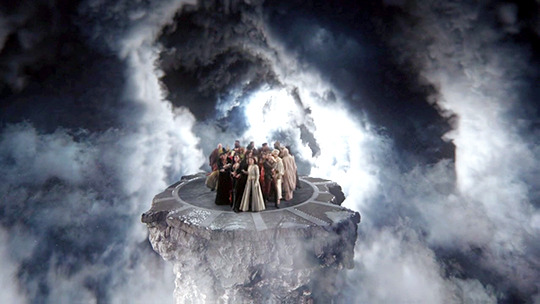
this is the sort of thing you’ve got to foreshadow at least a LITTLE
The acting was pretty damn good, though.
(Fair warning: don’t open this on mobile, there’s a ridiculous amount of pictures under the cut)
OK. So. Couple of things that I really liked up front, so I can gripe in peace later on. (And readers can skip whatever part they wish ; )
First, and I realise this is a weird thing to enjoy, but I loved how utterly despicable I found Fiona in this one. She may have hung around like a bad smell for most of the season without really doing much, but she sure stepped up her game for the occasion.
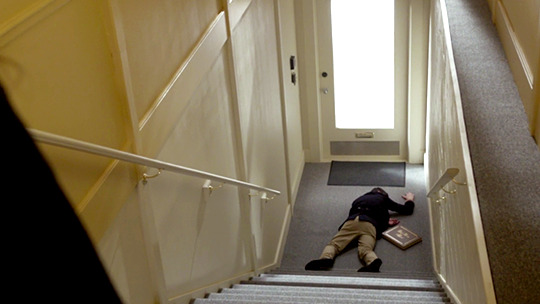
Seriously, if Rumple hadn’t killed her, I would have found a way. “Our son”, indeed.
Though, please, have some pity on the poor guy. At this point, he has killed both his parents, and one of them twice. That can’t be good for anyone.
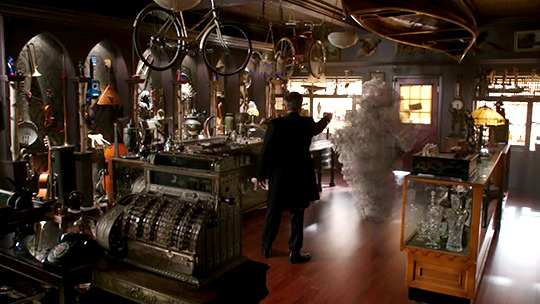
oh look the wall robots are still there
And speaking of Rumple… dang, that was a good scene in the mines. What I loved most about it was that this was literally all him. Nobody would ever know what he did in there if he didn’t tell them, except for himself, and he still made the right choice. Despite being offered everything he ever wanted, despite being under the influence of his curse just as much as ever…
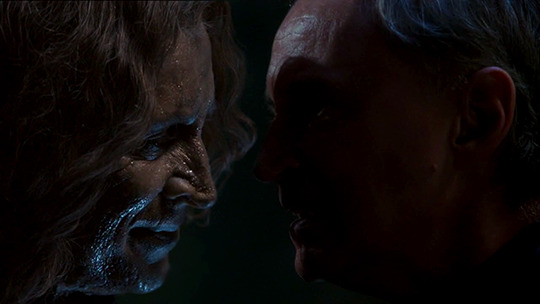
before you ask, yes, my mind did go Places
…and more literally than it’s usually shown. Well done, pal. I should probably be more excited about this, but despite the tense buildup, I feel like the scene kind of fizzled as a whole. Maybe because he already made the exact same choice earlier, and was just confirming that he really meant it, too. Still, it was a good moment, and I was very proud of this walking human disaster by the time it was done.
Some more on the topic of Rumple: congratulations on his acting skills. Rumple’s, not Robert Carlyle’s, specifically. Because there’s no way in hell I could have seen these photos…
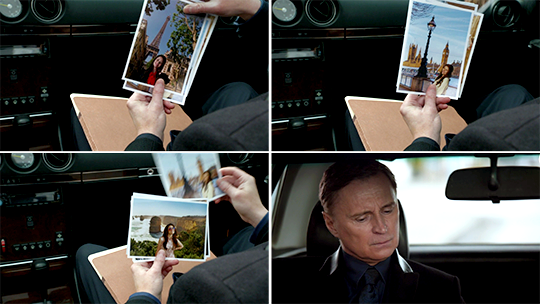
…and kept a straight face. Honestly, I’m half convinced that they were a test by Fiona to see if he was awake after all.
Oh, and the book!
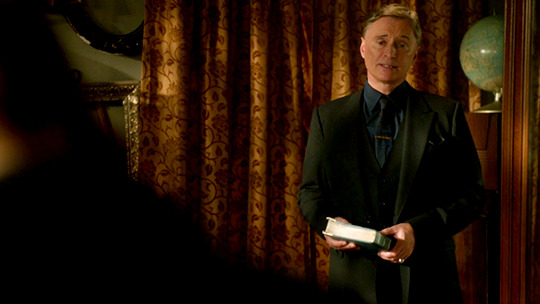
The book made it across! And you know why? Because Belle and her son have True Love, even if Gideon cannot remember that, because Fiona is The Worst. And Rumple worked so hard to make Gideon remember; it was heartbreaking to see. I mean, he had to do that for… what? Five hours? And he still couldn’t stand the thought that Gideon might believe his mother didn’t love him. It was a good scene, OK?
On a sillier note (but still unambiguously positive): Emma’s wardrobe came back for the finale!
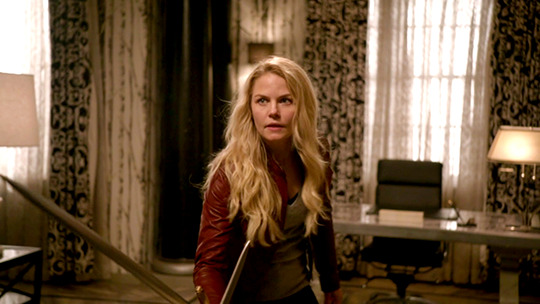
I don’t know, it’s just nice to see.
Other things I loved a lot:
Any and all interactions between Regina and her now-settled other half. Just. Pure joy, even in the midst of the wtf-ery. And with the obvious standout-moment when the Queen goes and sacrifices herself to give the others that tiny bit of time they need to get back to their world and help Henry (and Emma, but I think we all know who the priority was in this case)
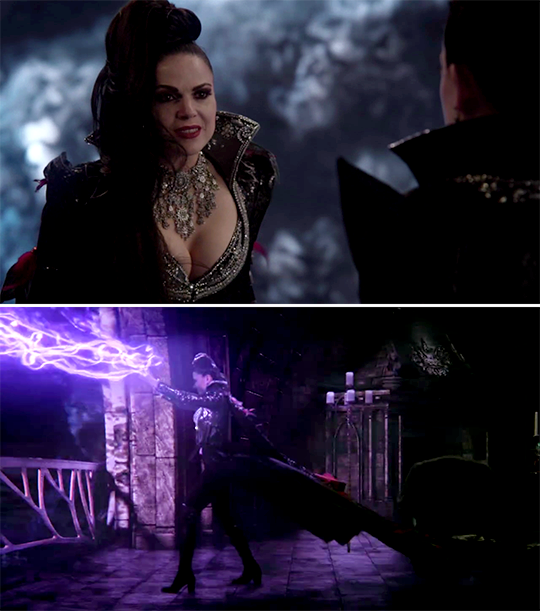
Just… damn. I’m still worried about this woman’s self-destructive streak in general, but this was a good moment. (It also helps that she got better. ‘cause that could have been really depressing otherwise.)
Oh, and since we’re speaking of Regina (or the Reginas, plural), I absolutely adored the speech she gave Emma. Just… I mean, I expect the hope speeches from Snow (and that one was pretty good, too), but this? I mean… wow. Please compare and contrast with season 1. Except you don’t have to, because Regina already did that, and it was beautiful.
Then we have an actual mirrored TLK (see below for a botched version…) in this very good moment:
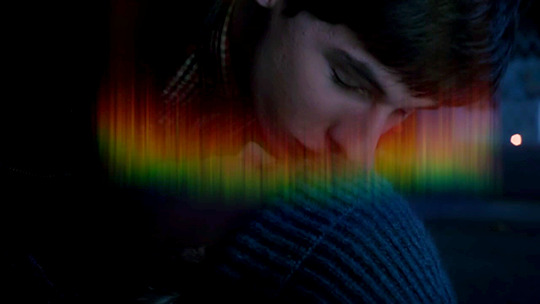
Like, yes, I love bookends, and this was a great one. Calling back to the “holy crap why didn’t I see this coming” kiss in s1 worked surprisingly well, considering how little interaction Emma and Henry had this season, but there’s enough material in the show in general to make me buy into this. Like I said: sucker for bookends.
In general, I feel like this episode was at its strongest whenever re-focused on the family relationships between the characters.
And to close it out, the ending montage.
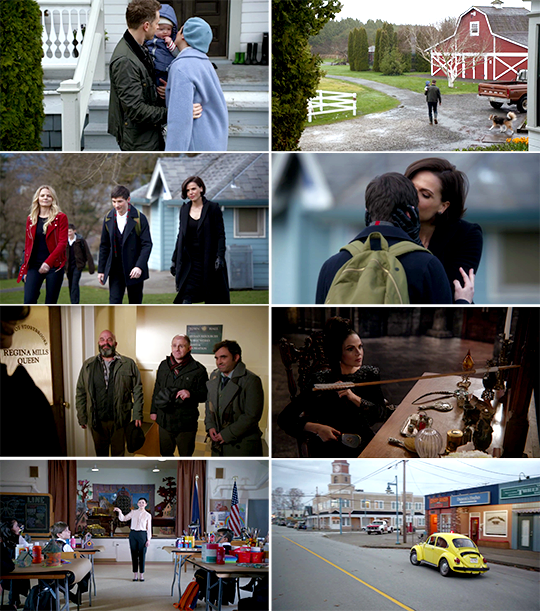
Just... it’s like Snow said. They get to live their happy endings now. Snowing finally have the time to be a proper family (and David got a dog!). Regina is accepted and loved by her people (and the Queen gets to have a completely “new adventure”, as Robin so aptly put it.) Snow can do what she loves and doesn’t have to fight all the time anymore. And Emma finally has a place in the world; one where she can settle and be comfortable and doesn’t have to be alone anymore... and I’ll just leave it at that. It’s a good ending.
And no, I haven’t forgotten it--obvious special mention to this bit here:
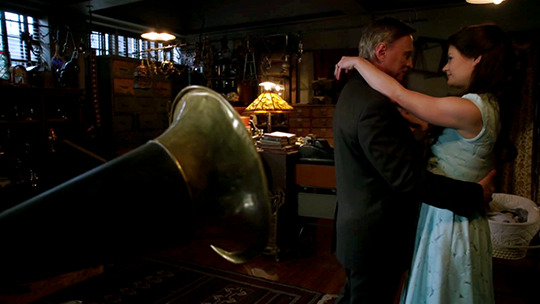
Yup. Killed me dead. And I died happy, thank you very much. They’ve been through so much bullshit, and now they can be together, and raise their son in peace, and won’t be really worried when he doesn’t stop growing, either.
I also want to give a special shoutout to the five six people who immediately made sure that I knew that 1) the kiss wasn’t scripted and 2) we, as a fandom, are extremely lucky to have Robert and Emilie. (For those who haven’t seen the interview in question, it’s here, and here)
The finishing dinner was nice, too, even if I’m not sure what the whole Last Supper imagery was supposed to do.
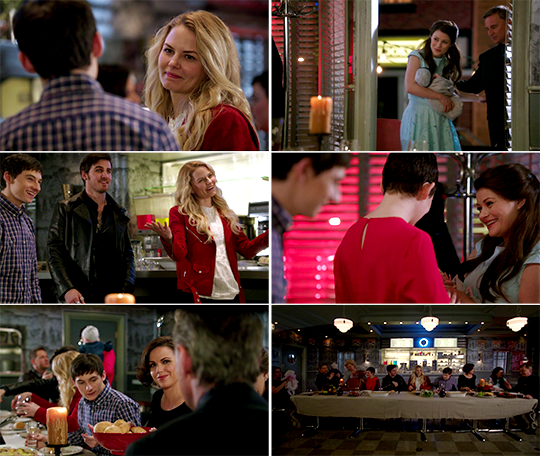
Listen, I’ve been going “just let them be happy!” for way too long to complain much when they finally are. Also, I could write an essay on the range of emotions Rumple goes through when he comes through that door and people are actually happy to see him and his family. Or about that look that passes between him and Regina, because I caught that and it made me cry! I don’t think either of them ever imagined they would really be this happy again when they first met and they’ve been through so much crap and just... guh. I like this. It’s a good closing shot.
And now, the rest.
Because frankly, this wasn’t a great finale. It wasn’t even that good of an episode. It was everything wrong with the 4B finale, only more of that.
For example: What was the deal with making Emma lose her belief? Since when was her belief required for the magical realms to exist? The only person who’s ever had even something approaching that function was Henry. She didn’t need to believe in magic to keep it alive, she needed it to break the curse.
And this was never set up as the Black Fairy’s plan. Not even a little. This came so out of left field, it wasn’t even in the same stadium! And it’s so frustrating, because this wasn’t a bad plot, as such, but there was no build-up, no real payoff, nothing. Or, let me put it differently: this was a perfectly fine plot resolution, it just had no business being attached to this season.
Everything felt rushed, there were about five dozen plot points, none of them with any time to breathe and somehow, we still got that terminally boring climb up the bean stalk.Sorry, David, you know I love you, but what was the point of that sidetrack? Nothing happened. There was no try-and-fail cycle (because there wasn’t time for one) and honestly, if you needed a handwave for how they got back from the magical realms, maybe you could have gone with a less time intensive one?
And that moment where Snow kisses David back to life? Yeah, unearned, again. And dear show: the cut-in from the first episode worked for the split-heart curse, because you were subverting it. But here? It just didn’t do anything. This wasn’t a parallel. David wasn’t cursed, he was crushed by a beanstalk.
And speaking of things that don’t make sense…
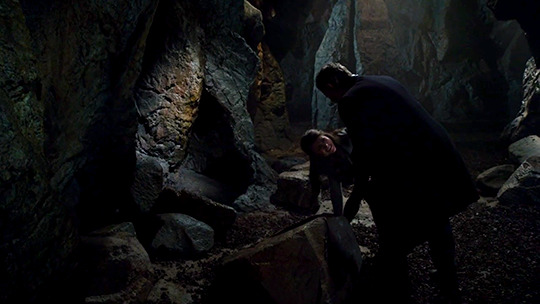
For the love of fuck. Her ankle? Really? This is such a cliché that even the slasher genre doesn’t do it anymore. And it’s a dumb cliché, too. It’s rooted sexism and it makes it look like you didn’t have any other ideas. I get it, you don’t want Belle with Rumple at that final point so she doesn’t influence his decision. Here’s a thought, then: let her stay behind for a good reason! Or, hell, if you don’t want to write a scene for her (the writers sure seem to be allergic to giving Belle any screentime), let there be a fork in the road! They don’t have the time to check each one, let Belle go one way and Rumple another. It’s still a lazy plot excuse, but at least it’s not the stupidest cliché in the book.
And one more thing…
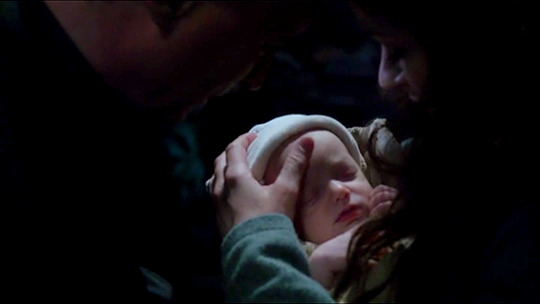
::sigh:: I have such mixed feelings about this?
Because on the one hand: Gideon had a life that nobody would want. He was kidnapped, imprisoned, kept in the dark and abused for all of his twenty-eight years, and even if he got free, he would never get that time back. Nobody would ever choose that for themselves.
At the same time… Gideon died. The person I got to know over the last half-season is no more. He’s gone. And he never had any say in the matter. Hell, he didn’t even get to say goodbye. It’ just such a messed-up way to get a wonderful thing.
(Also, while I’m on that topic… yes, I did notice that Rumple didn’t recognise his very tiny son at first, and I realise that it’s because he’s never seen him before. It prompted a particularly long “oh noo…”, too.)
And finally…
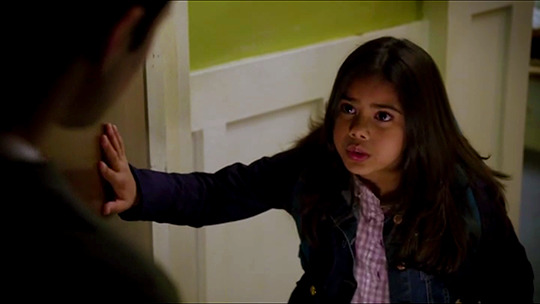
… that cliffhanger/teaser, though, huh?
I have so many questions. Why was Henry in that monster forest? Why is he now in an apartment and doesn’t remember his daughter? When did he get a daughter? (Also, who with? Enquiring minds would like to know.)
So. I know, like, three things about s7, and one of them is the cast list. Please try not to spoil anything else, because that’s already way more than I wanted to know going in. Seriously, I’m a reasonably grown adult. I can deal with a couple of surprises.
#ouat#once upon a time#ouat the final battle#sieben watches ouat#sieben talks#ouat writing critical#anti cs#anti hook#(by implication mostly)
42 notes
·
View notes
Photo
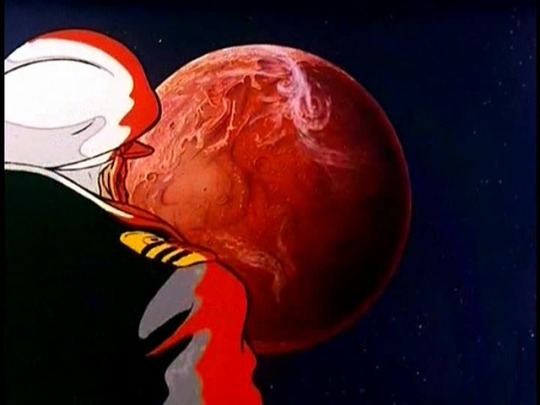
EPISODE 1
“I cannot bear to see what has become of Earth. Once green and growing, with blue lakes and silver streams, great rivers and mighty seas! Now, all gone! Only day and burning desert left, radiation everywhere!” - Captain Avatar
So begins the very first episode of STAR BLAZERS, first broadcast in syndication on Monday, September 17, 1979. It’s an opening, and indeed an episode, utterly unlike anything else then being broadcast on American television at that time--and it still retains all of its emotional power.
It’s a very strange episode in one sense: you don’t get to the actual premise of the series until Episode 2, so this first installment is almost entirely backstory. But the one thing it does brilliantly is to establish a sense of hopelessness and despair--not at all common things in a children’s cartoon. From the very first line uttered, we see that the Earth is in a terrible state, literally on the verge of extinction--and things will not get much better for the next 23 minutes.
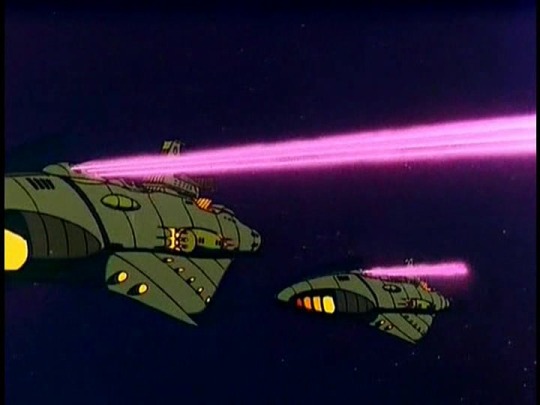
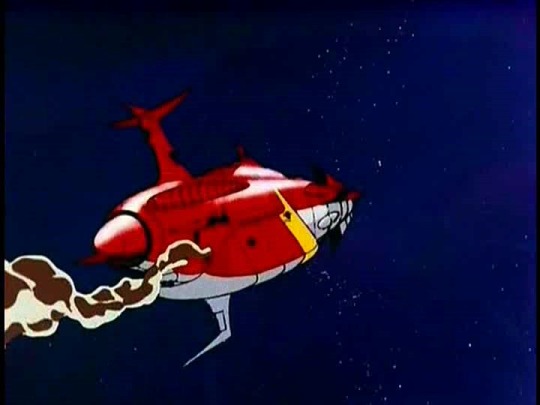
STAR BLAZERS was freely adapted from the original SPACE BATTLESHIP YAMATO, first aired in Japan in 1974. But the producers made a number of changes when importing the series for the American marketplace. Chiefly, these alterations involved the removal of sequences of excessive violence and culture-specific touchstones that wouldn’t translate to an American audience. But in a number of cases, they played around with the actual structure of the episodes themselves.
In YAMATO, the state of the Earth isn’t revealed until the halfway point, when Captain Avatar/Okita’s crippled battleship returns from space. But in STAR BLAZERS, that entire sequence is moved to the front. And so we learn immediately that the planet has been poisoned by a superior enemy from outer space, that Earth’s space fleets have largely been defeated and destroyed, and that the whole of surviving humanity has relocated to cities constructed miles deep inside the Earth itself. In terms of presenting the emotional power of this idea, I think I prefer the STAR BLAZERS arrangement, where the narrative cards are put on the table right away.
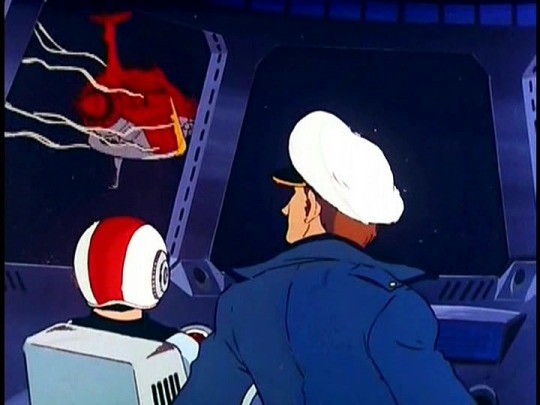
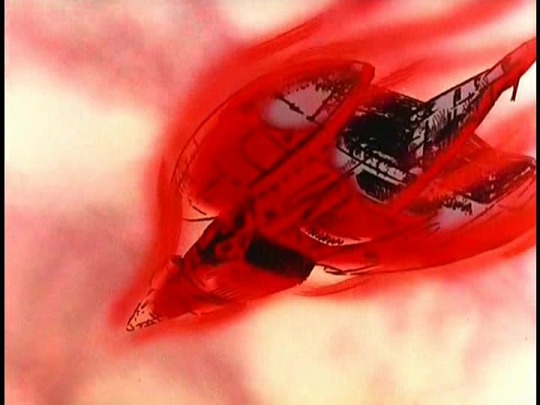
The episode is also canny in terms of how it lays out its cast. Coming into it cold, the viewer has no idea which characters are meant to be regulars and which will not. So when we’re introduced to Alex Wildstar, commanding the missile ship Paladin among Captain Avatar’s last remaining space fleet, it’s only natural to assume that he’s going to be a central player.
A quick word about the character names. Yes, they are all just a little bit silly--but honestly, no sillier than Luke Skywalker and Han Solo, or Starbuck and Apollo. The production team was really following the conventions that had been recently established for naming your space-faring heroes. Honestly, the most remarkable thing about it is the choice of a non-traditional first name such as Derek for their lead character. It’s not especially common, and like Luke, it’s got a certain cadence to it. The contrast personality-wise between Derek Widstar and Mark Venture is apparent right in their names. You can hear them and immediately get a sense as to what sort of character they are.
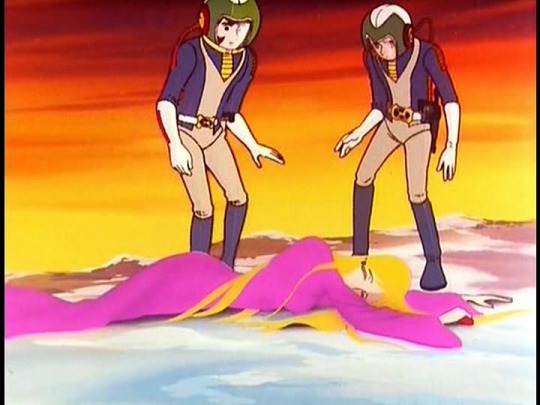
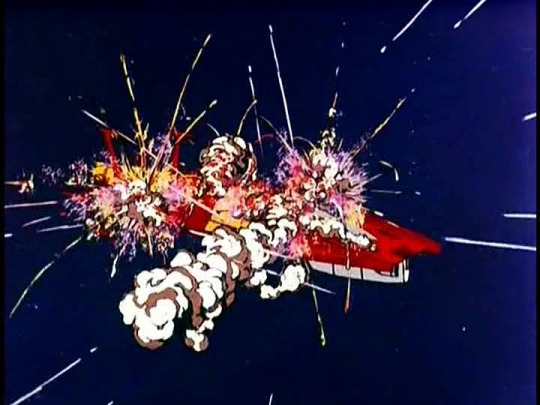
Perhaps the most remarkable thing about this first episode is the sacrifice of Alex Wildstar. Especially in these early episodes, the production team appears to struggle with just how they’re going to deal with all of the very serious situations they’re going to encounter during the course of the series. In some cases, they’ll splice in footage to ensure viewers that a particular character survived an obviously-fatal encounter or to obfuscate a death. Past a certain point, though, there’s a sense that they realize that they’re not going to be able to keep this pretense up, and so they largely abandon it, leaving it only for the most extreme cases (”Knox got out just behind you!”)
And in 1979, the apparent death of Alex Widstar is strong stuff. he goes out a hero, of course, sacrificing his ship and his crew to allow Captain Avatar the time to retreat (”It’s just a simple matter of mathematics, sir! There are 470 men on your flagship! There are 20 on our ship!”) But his death is actually mourned, and felt, throughout the remainder of the episode. We see its impact directly, on both Derek Wildstar and on the old, grizzled captain, and it’s the event that defines their relationship. Tragedy was also not something we were used to experiencing on weekday afternoons.
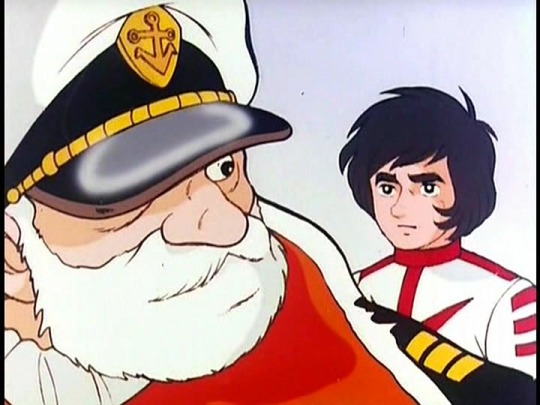
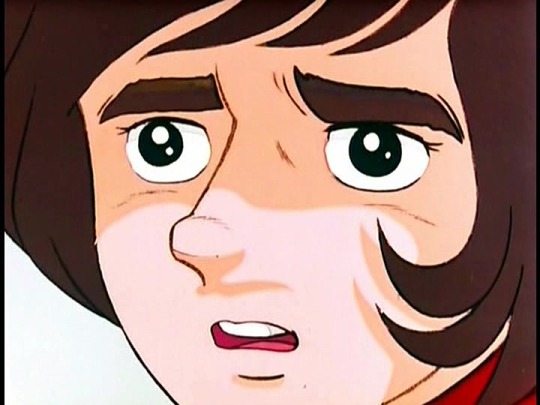
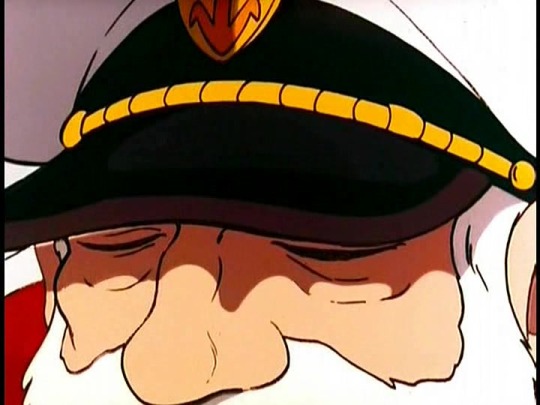
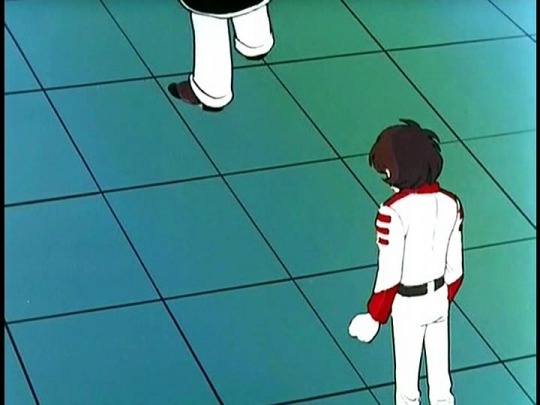
No less affecting is Wildstar and Venture’s descent into an Underground City after they’ve returned from space with the message capsule from Iscandar, and we follow that geiger counter as it ticks away as they go. and they speak about the inevitable oblivion that they and all they love are facing. No two ways about it, this is a depressing episode, and it doesn’t pull its punches much in terms of getting across the themes and the stakes.
But it’s not all doom-and gloom. There is, of course, the message of hope from Starsha of Iscandar, promising the Earth the Cosmo DNA that can restore it to prosperity, and delivering unto humanity the plans for the Wave-Motion Engine that can help mankind to bridge the unfathomable 148,000 light years that separate the two planets. There’s also some light fun to be had as a few other key players are brought onto the canvas, Dr. Sane and the robot IQ-9, as well as his nurse, Nova.
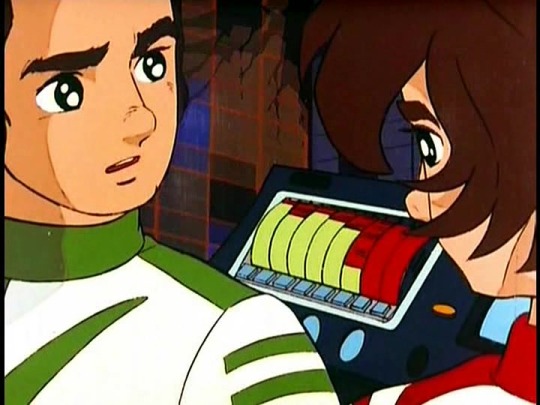
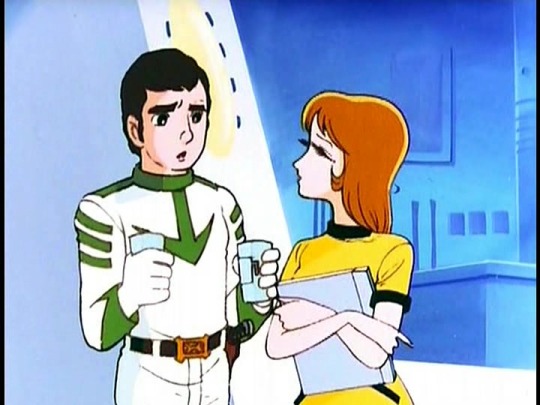
It’s perhaps worth pointing out that, in the entirety of this inaugural episode, we never so much as see a Gamilon. They are a faceless, implacable enemy, represented only by their ships and planes and guns. This parallels the experiences for the characters as well, as we will learn that, one big narrative mistake to the contrary, most people on the Earth have never laid eyes upon the enemy who has brought them to such ruin.
From a creative sense, it seems to me that this taps very much into the sentiment of post-WWII reconstruction-era Japan, the time in which most of the creative staff of YAMATO grew up. That same sense of defeat, of humiliation, of helplessness in the face of destiny permeates throughout this episode. In a very real way, YAMATO is WWII-era wish fulfillment: “what if, when American unleashed the Atomic Bomb on us, we were able to hold out, and send our strongest ship, the representation of our nation and culture, against them!” For many of these creators, they themselves may not have come into contact with an actual American.
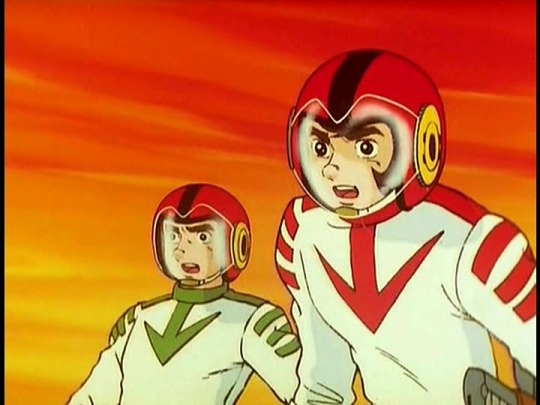
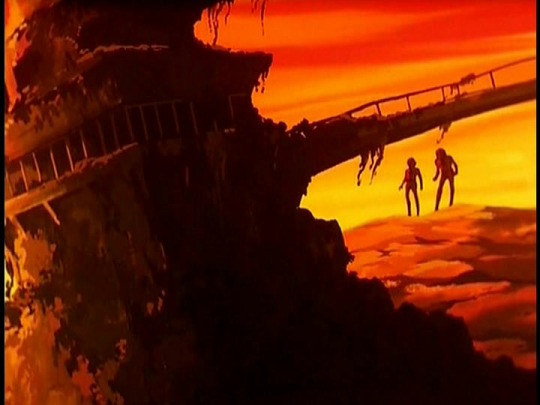
And so we come to the wrap-up of the episode, wherein the battle-hungry Wildstar and Venture steal a fighter to attempt to engage an enemy plane making a sortie above the sunken battleship, the Yamato. At this point, we still don’t really have any idea what this show is going to be about, but we get our first taste after the two cadets crash in the dry sea bed, and the strains of that soul-stirring theme music begin to swell as they crest the ridge.
The music was a big part of what made STAR BLAZERS work. That original YAMATO score is so powerful and evocative that those of us who watched the show sought it out, on record albums and cassettes once we became aware of their existence. It must also be said that while the STAR BLAZERS theme song is itself rather silly--I expect there isn’t a STAR BLAZERS fan of the era who wasn’t taunted by other kids mockingly singing portions of it--it’s also strangely affecting and sincere. It’s about something, it resonates.
And so this first episode closes dramatically, with the view of a 200-year-old decayed, sunken battleship and the narration uttering the question that will bring us back on Tuesday: “What is the secret of this ancient battleship?” We will soon find out.
6 notes
·
View notes
Photo

The Messy Fun of B-Canon
Should I Read It? Short Answer: Yeah! Not the most involved story the comics have gone into, but for a single issue, it’s certainly a worthwhile little story, especially if you’re interested in Starswirl the Bearded and/or Luna and Celestia’s past.
Spoilers will be discussed from now on, so enjoy the comic on iTunes, in stores, from wherever you get your comics, or here in video form (uhhh, what? Who said that? Reading comics for free—pffft, I never do that…).
Starswirl the Bearded is a mysterious figure in MLP lore. One who’s actually already had several different depictions outside of the show, and yet still remains so because at this point it’s become up to preference which you consider canon.
The most notable are the stories where we get to spend time with him, as mentions like the Rainbow Rocks backstory and brief appearances like the Sirens’ Fiendship is Magic are certainly neat, but don’t offer too much in the way of real character aside from what you may read into yourself.
The Journal of the Two Sisters gives us a look at him through the eyes of a very young Luna and Celestia, who at the time are just becoming princesses because he (and the ponies from A Hearth’s Warming Eve) approached them. He apparently even coronated them himself, so it’s no wonder why they looked up to him right from the start (if, found him a bit “unusual”).
Here, it’s his strangeness that lead him to creating so many spells, according to Celestia, as he thought of things no one else would.
This seems to fall in line with the old kooky Pinkie parallel depicted in the Reflections arc. Luna makes that comparison herself at one point, and it’s quite apt. He’s rather silly and eccentric, explaining his fascination with a big old hat with bells on it in a funny way without taking away too much dignity from the figure.
After all, we know Pinkie. The more Starswirl is likened to her, to more we know his silliness will never go so far as to make him shallow or uncaring. He proves throughout his time in this arc, too, that he can be serious when necessary—even, perhaps, to his detriment.
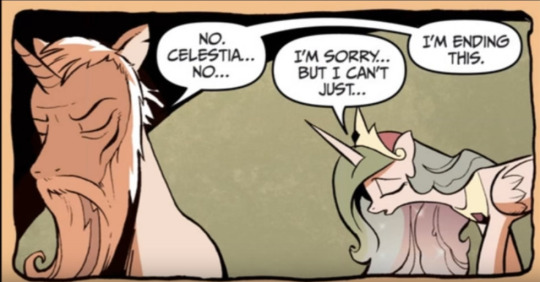
In Reflections, he has to tell Celestia to stop travelling to the alternate dimension where the good King Sombra lives. It’s for a good reason, there can be consequences to this dimension-hopping romance, but I have to wonder if this is why Celestia thinks Starswirl never understood friendship as well as Twilight did.
The guy’s certainly not heartless or cruel, and not much of a loner, really, so we’re left with choices like this to demonstrate why Celestia hold that view of him. She was pretty heart-broken over this, so it might just be her bias speaking.
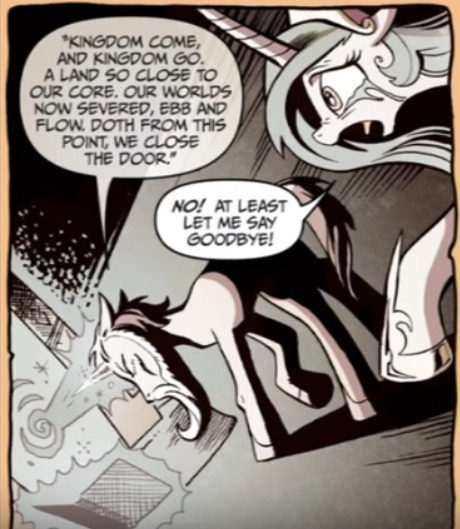
Or, perhaps this is symptomatic of Starswirl’s usual mindset: instead of doing what he could to help this blossoming relationship survive (finding a way around all the paradoxes since he’s, y’know, a magical genius), he forbade it for the greater good… which, I mean, only resulted in Celestia sneaking behind his back anyway, but whatever. He had a good reason, it just may have damaged their relationship in the long run, as Celestia later says things were never the same between them after he found out she disobeyed his orders.
On that bright note, now we come to the Legends of Magic depiction of Starswirl!
Here, he’s a fair bit younger and seems rather strict. He’s not afraid to give the girls some tough love to get a lesson to hit home.
If Legends and Reflections are still canon with each other (question mark), it paints a nice picture of him; an all around eccentric guy who was a strict mentor in the beginning, and perhaps grew sillier and with age, but was still able to lay down the law when needed.
For that matter, it’s interesting to me that the most prominent depictions of Starswirl always seem to have a balance between his silly side and his strict, non-nonsense mentoring side, because they both come with pros and cons.
His more out-there side, where he takes himself less seriously, seems to provide some of his most brilliant ideas and allows for him to have a sense of humour. It seems this is when he’s best able to connect with his students, too. Even if he is a bit of a goof.
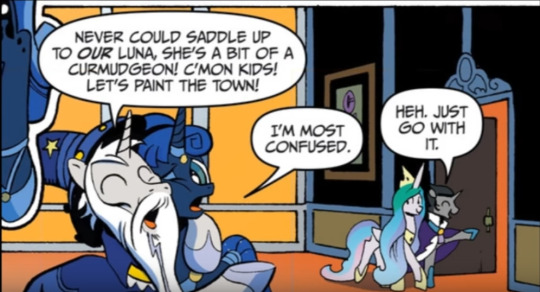
You people wonder why I keep babbling about the parent-child parallels between the teachers and students in this dang franchise. It cute.
On the other hand, his worldly, serious side lets him take charge in dangerous situations and get through to his two students when they need it most. Although, it can come off as callousness and has hurt both Luna and Celestia, even if they needed the lesson.
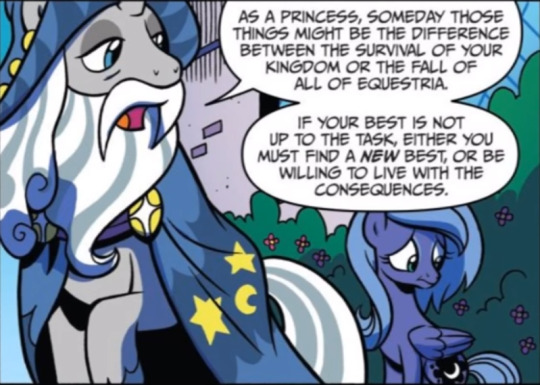
Granted, having two opposing traits battling for dominance might be the result of the writers of these various materials not necessarily coordinating, but it can also be seen within each work, and I think it works really well. The worldly adventurer and the old eccentric are two well-worn tropes that could be used on their own when developing Starswirl’s character, but by combining these tropes into one character, you get a more interesting, 3-dimensional dynamic!
Although, these two sides to Starswirl aren’t the only thing that seems to contradict itself, and it’s here where this analysis/review has to talk about… *shudders* continuity errors.
Well, okay, I can mostly shrug off minor continuity errors here and there (mostly because even for the brief time I wrote for a fan show, I found it crazy how many little details I had to be reminded of by other writers in the chat; I have admiration for the poor bastards who do this for a living).
On the other hand, continuity errors so big that they bring other stories from b-canon into question are a different story. I still have sympathy for the writers, but that just makes my job as a (non)Professional Analytic Bullshitter much more… creative.
So, let’s try to explain (bullshit) some pretty big continuity errors, shall we?
Continuity Error? # 1: Starswirl’s Impeccable Sense of Timing (… get it? TIME)
Okay, so we know the order of these stories—Journal, Legends, Reflections—but that’s about where the logical flow stops.
During the beginning of Legends, Celestia tells Sunburst that Starswirl went missing before Luna became Nightmare Moon, but that directly contradicts the flashbacks laced throughout Reflections, which took place (for the most part) after Luna became Nightmare Moon.
There’s also the fact that Reflections keeps stubbornly referring to Starswirl as Celestia’s mentor, not Luna and Celestia’s—to the point that Luna at one point says she doesn’t remember much of him outside of his appearance.

2/3 say he mentored them both and that’s cuter in my book, so screw that.
So, let’s just focus on the mysterious whereabouts of Starswirl the Bearded. That one sounds cooler, anyway.
Some fans have already speculated that Celestia might be lying to Sunburst about exactly when and how Starswirl disappeared, basically just to cover up the whole I-almost-destroyed-not-one-but-two-dimensions fiasco, which is an explanation that has merit.
In Reflections, Celestia apparently kept this whole story a secret from even Luna up until she absolutely had to tell her. Mostly because of all the guilt and other messy feelings involved, but this was something she and Starswirl originally experimented on in secret.
If she didn’t tell her own sister for that long, I could see Celestia covering up the sad truth that she lost Starswirl both emotionally and physically sometime after she lost her sister. Especially if she still blames herself for at least one of those.
Continuity Error? #2: The Castle
There’s a bit of confusion now on when exactly Canterlot Castle was built, if the sisters appear to be living there as teenagers in this comic, but built The Castle of the Two Sisters in the Everfree forest shortly after their coronation as kids.
However, while I don’t know if this was intentional or not, I can find an explanation in the Journal. When Luna and Celestia were coronated, Princess Platinum, Chancellor Puddinghead, and Commander Hurricane didn’t just buzz off. In fact, at the time Luna and Celestia didn’t even have their cutie marks yet, so responsibilities like raising the sun and the moon were left to teams of ponies (one of which being Starswirl).
It would stand to reason to me that Canterlot Castle originally belonged to that lot of leaders, as a sort of middle-ground between their three castles since the country was united.
This seems to be backed up by something Celestia writes:
“I had a great time meeting with Private Pansy, Clover the Clever, and Smart Cookie, the three representatives from the Pegasai, Unicorns, and Earth ponies who originally came up to Canterlot.” - page 57, The Journal of the Two Sisters
They may have ruled from there all together, or met there for meetings, or what have you, but that would make sense. Even if they wanted these young alicorns to represent all Equestria, they couldn’t exactly leave it to inexperienced children to do it quite yet.
Speaking of which…
Continuity Error? #3: Princess Personalities
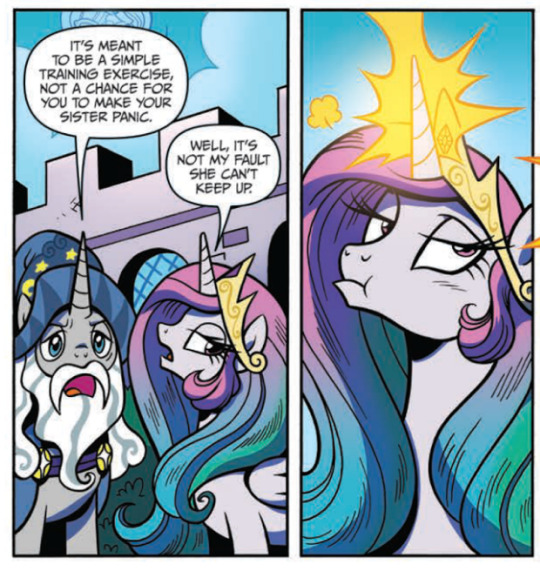
It’s not just Starswirl who got a brand new bag for Legends of Magic #1! Teenage Celestia in particular shows off some real thoughtlessness and attitude, really rubbing it in that her younger sister can’t keep up with her.
Some have called this into question, as in the Journal of the Two Sisters, a young Celestia is quite the dork. Geeking out over libraries and scrolls, anxiously doubting the choice to make her a princess, etc.
She’s certainly very thoughtful (even Twilight-esque) at a young age, so it might seem backwards for her to be even more immature as a teenager.
But, then again, we know the timeline here.
By the time Celestia’s a teenager, she’s been a princess for years. The Journal only covers the time just after her coronation (in addition to being her and her sister’s journal, with a obvious bias) and when she and Luna got their cutie marks.
There’s a time-gap in between that might seem a bit small in comparison to the hundreds of years she seemed to remain relatively unchanged. However, given how fame and power has been known for corrupting those who grow up surrounded by it, it’s not too far-fetched for me to think vast amounts of ponies worshiping her for doing something no one else has ever had the power to do on their own got to her.
Besides, that seemed to be in the narrative of the original lore. Celestia was praised, and because of it was relatively blind to her sister’s slow descent into jealousy and depression.
Speaking of which, between Celestia’s unkind treatment and the Nightmare forces, I’ve seen it suggested that Luna seems to be more a victim of circumstance than a true villain in her own story.
The delicious dramatic irony in this story only adds to that perception. A young Luna is the only one who can hear the dark whispers from the dimension she was dragged into, and it seems that whatever wanted her power seemed to think she’d already become Nightmare Moon (or, was trying to speed up the process).
Plus, Starswirl keeps foreshadowing her descent in ways that might be too obvious for some, but just make me feel so sorry for them, that they think they’re out of the woods for good. I’m a sucker for the sap.
But as to whether Nightmare Moon was Luna’s fault, I still think it was Luna’s choices and jealousy that sealed her fate. Whether Nightmare Moon was a force entirely from Luna or not, she was willingly calling on it. At most, Luna seems a bit in awe of the forces transforming her, but it was absolutely her decision to listen to the dark whispers in the back of her mind.
So, in the end, that just makes Legends of Magic all the more endearing, with the power of hindsight. I can totally see how the continuity … mess would turn some readers off, and how some will find the foreshadowing/dramatic irony (more so the latter, since we as the audience will exclusively appreciate this with the knowledge of what’s to come already in mind) for Luna’s fall a bit heavy-handed, but dang, if the character dynamics in this trio worth the long wait for more of their adventures.
With any luck, that’s the part of this comic that ties into season 7. Here’s to hoping!
Year of the Pony
#yearofthepony#year of the pony#starswirl the bearded#princess celestia#princess luna#mlp#my little pony#mlp:fim#mlp: fim#friendship is magic#My Little Pony: Friendship is Magic#mlp analysis#mlp reviews
34 notes
·
View notes